Donor Impact Report
What we accomplished together in 2019
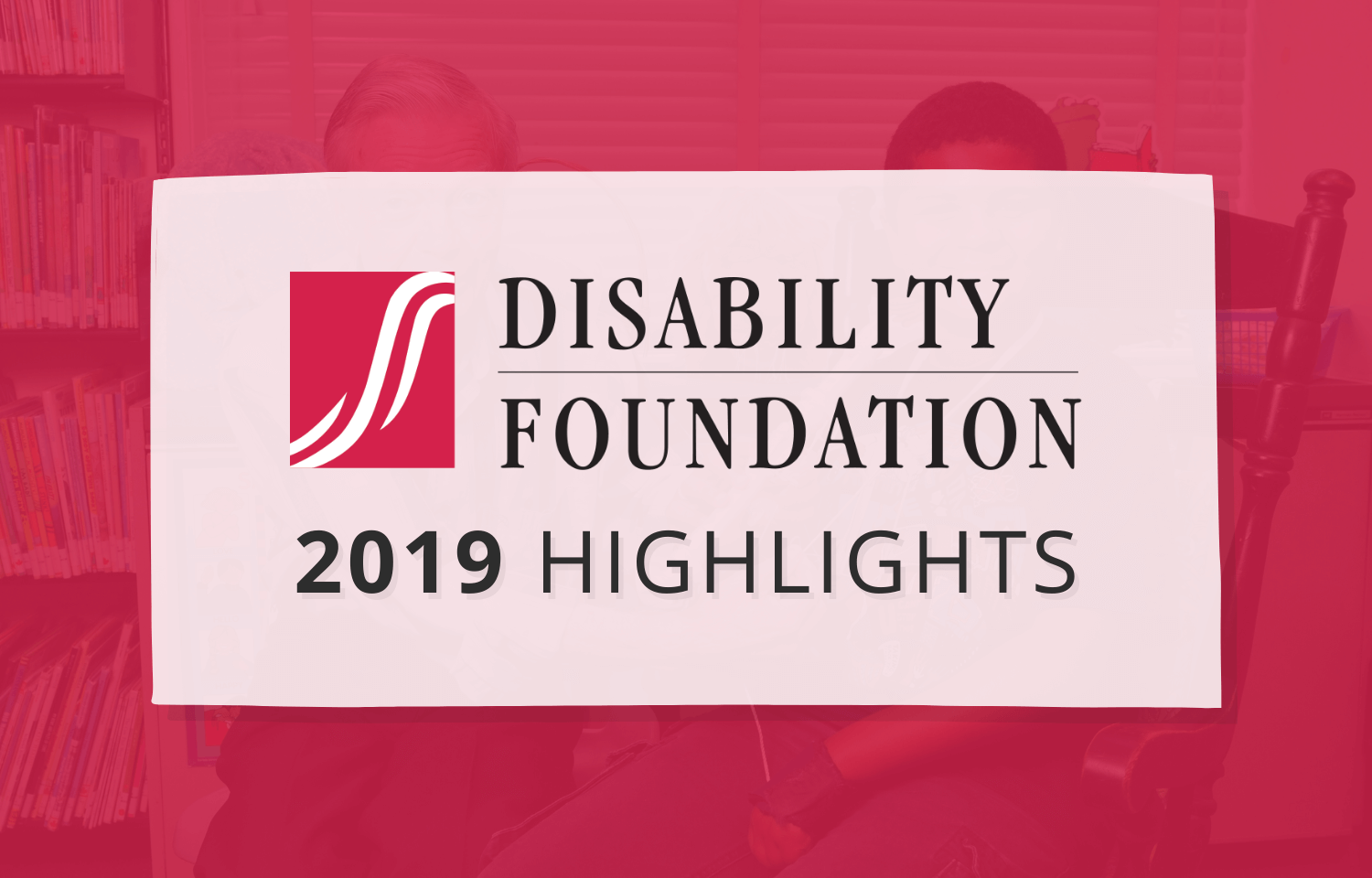
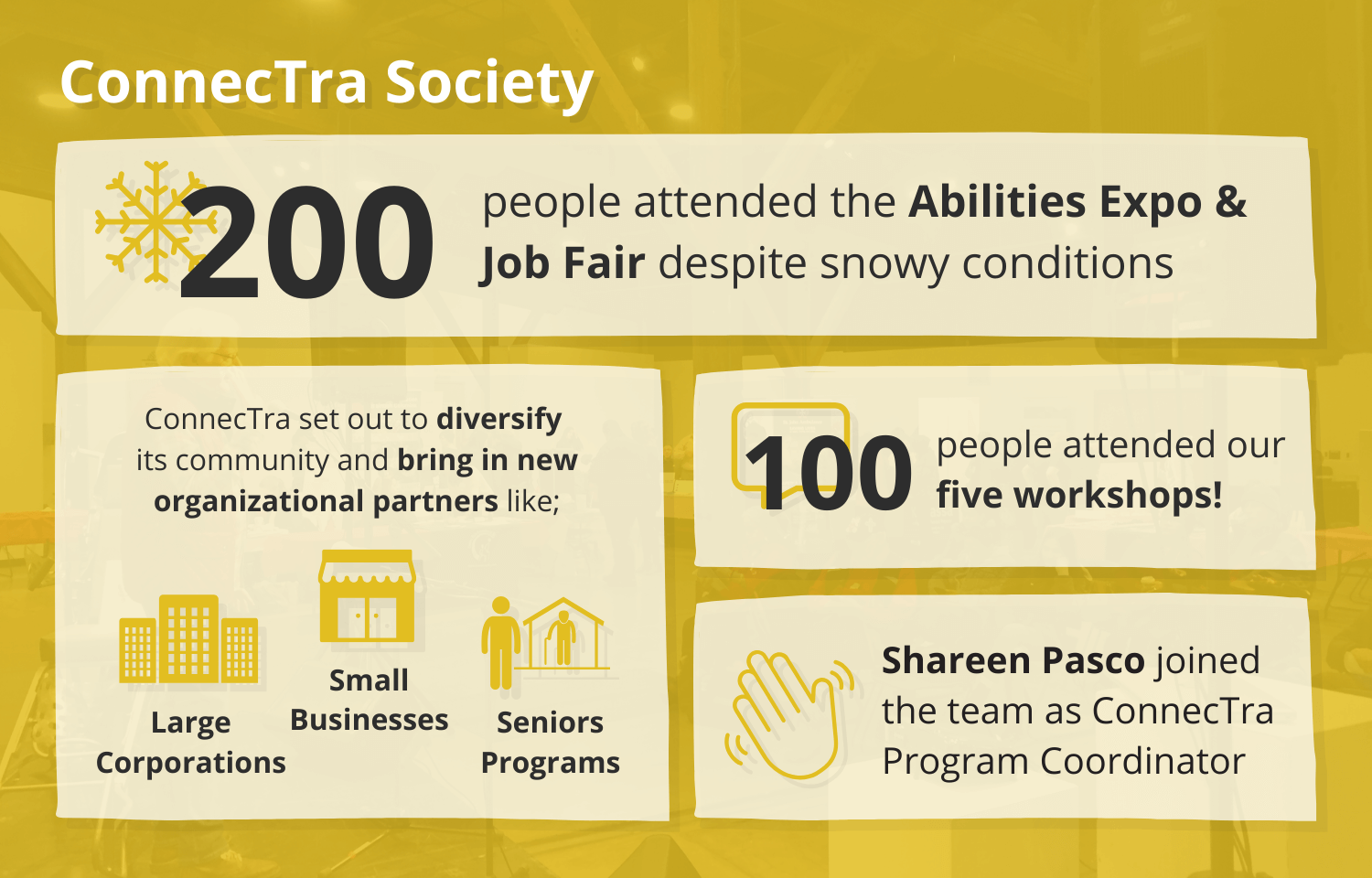
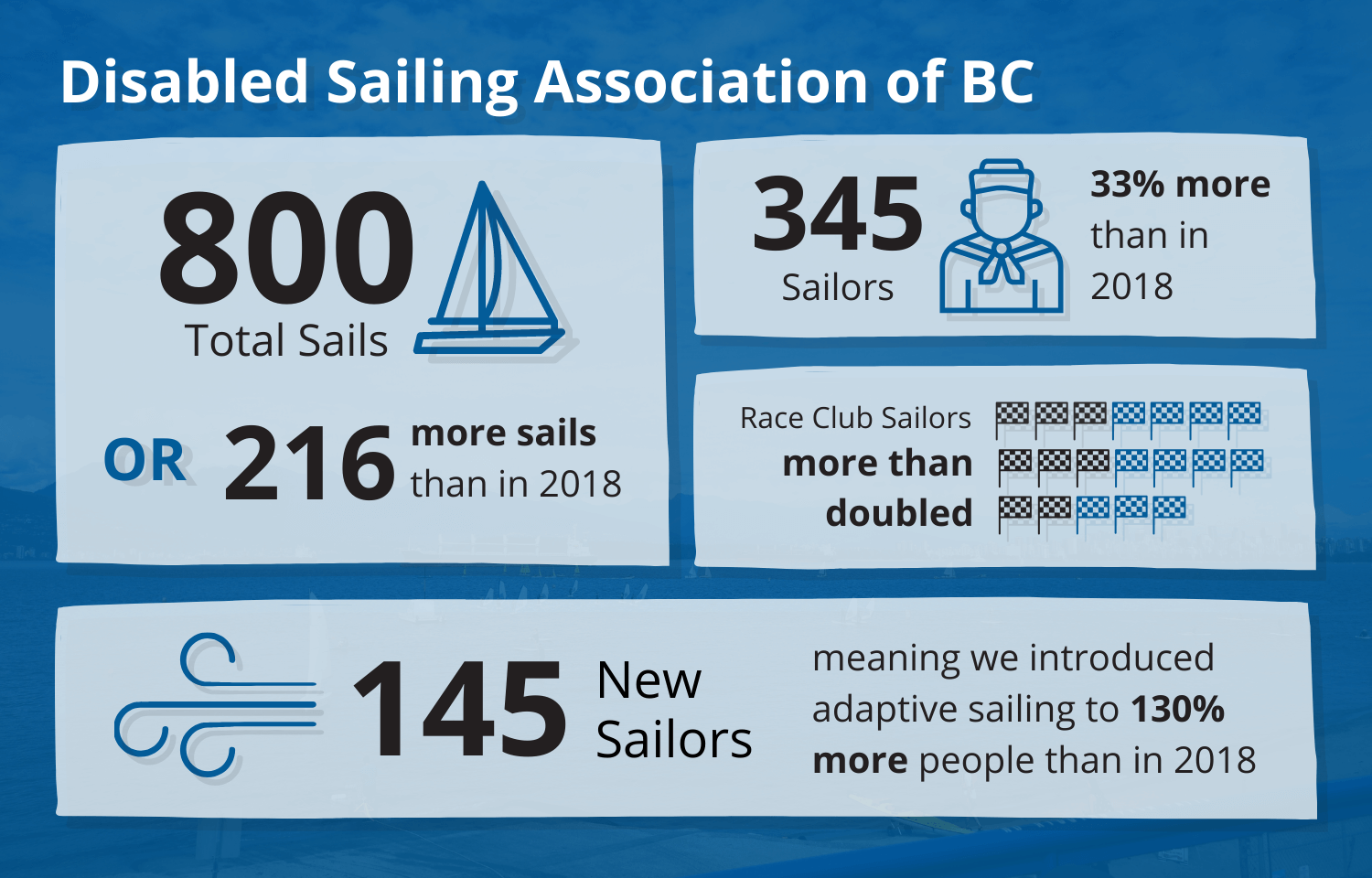
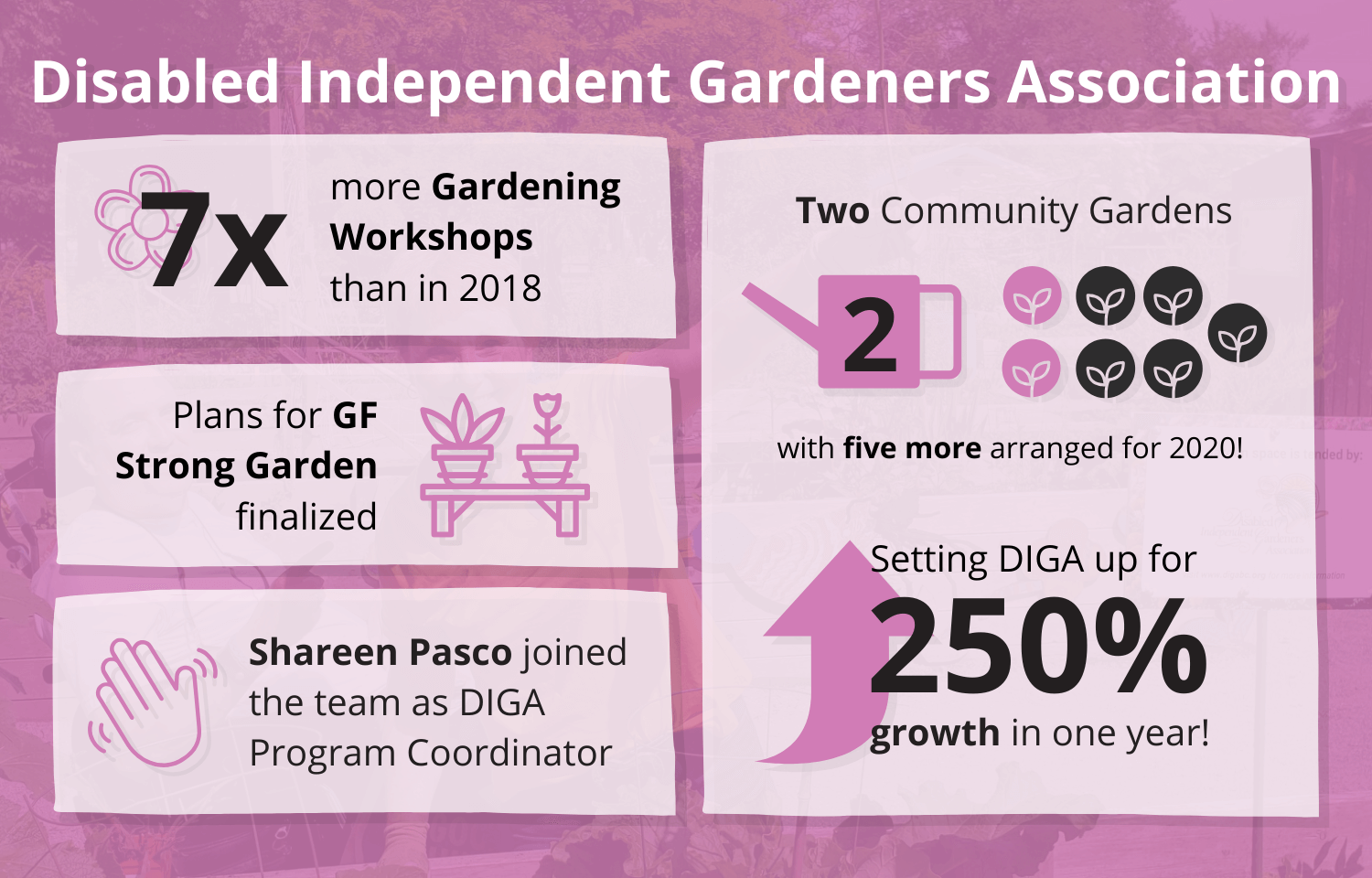
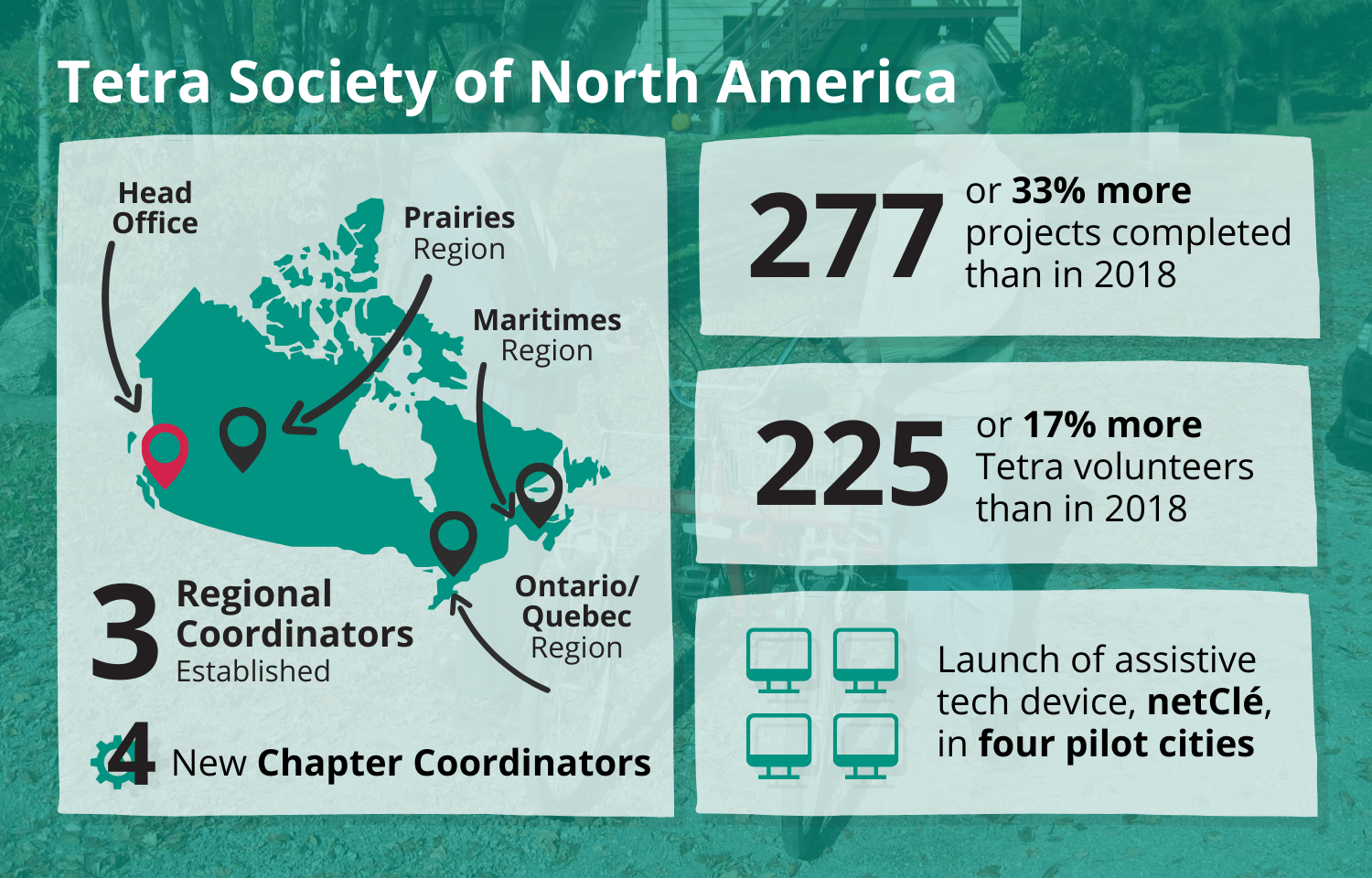
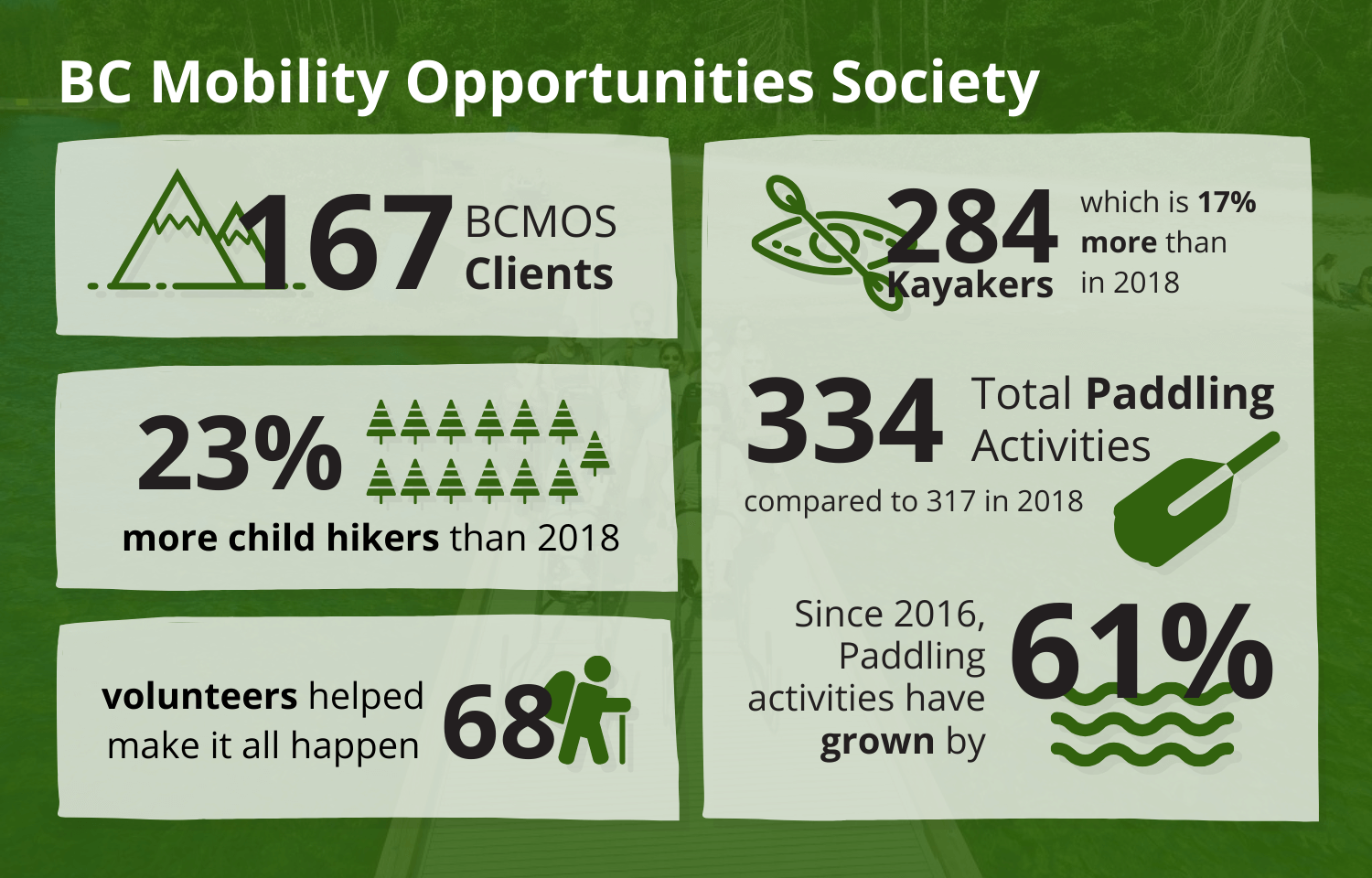
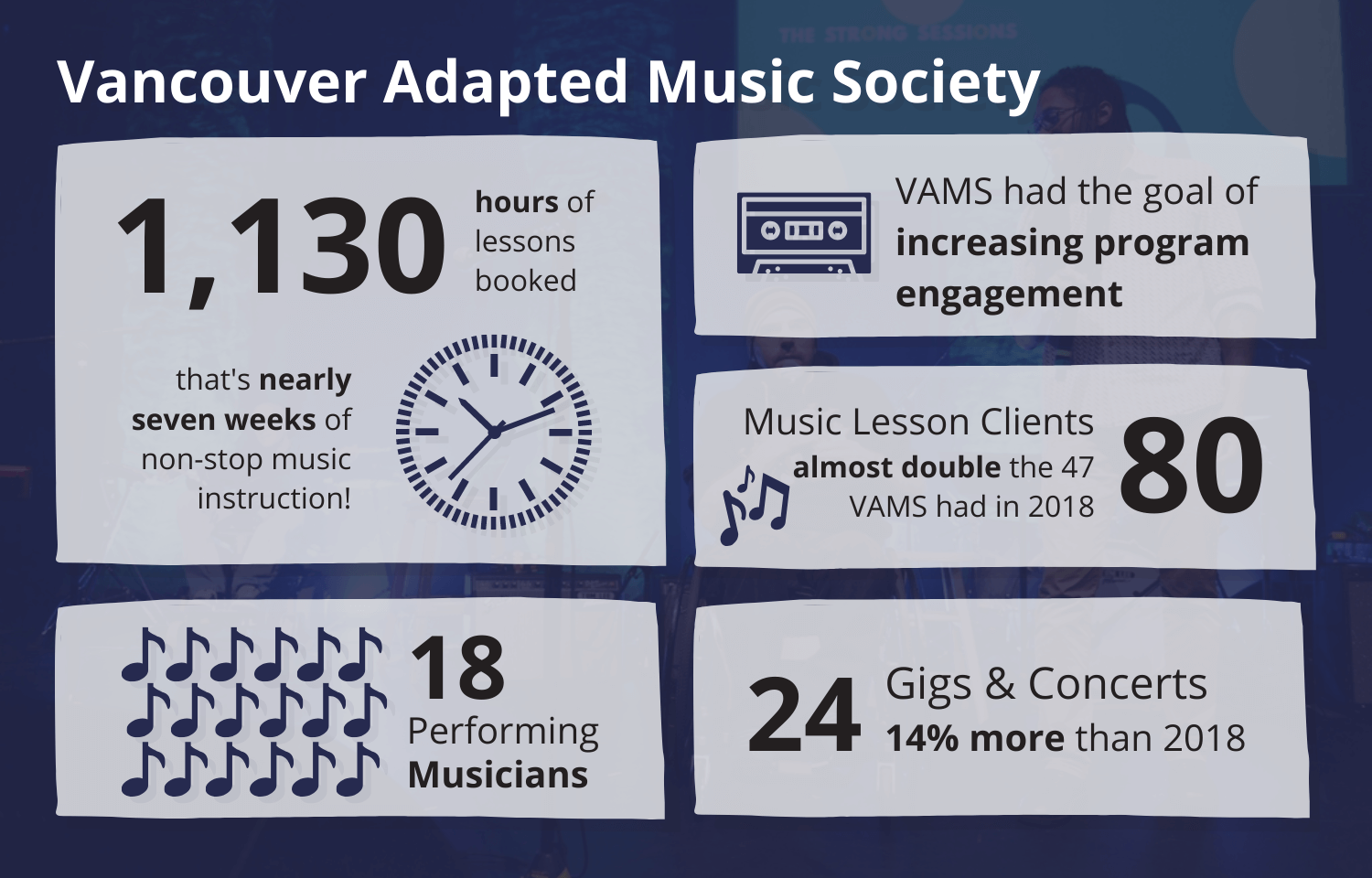
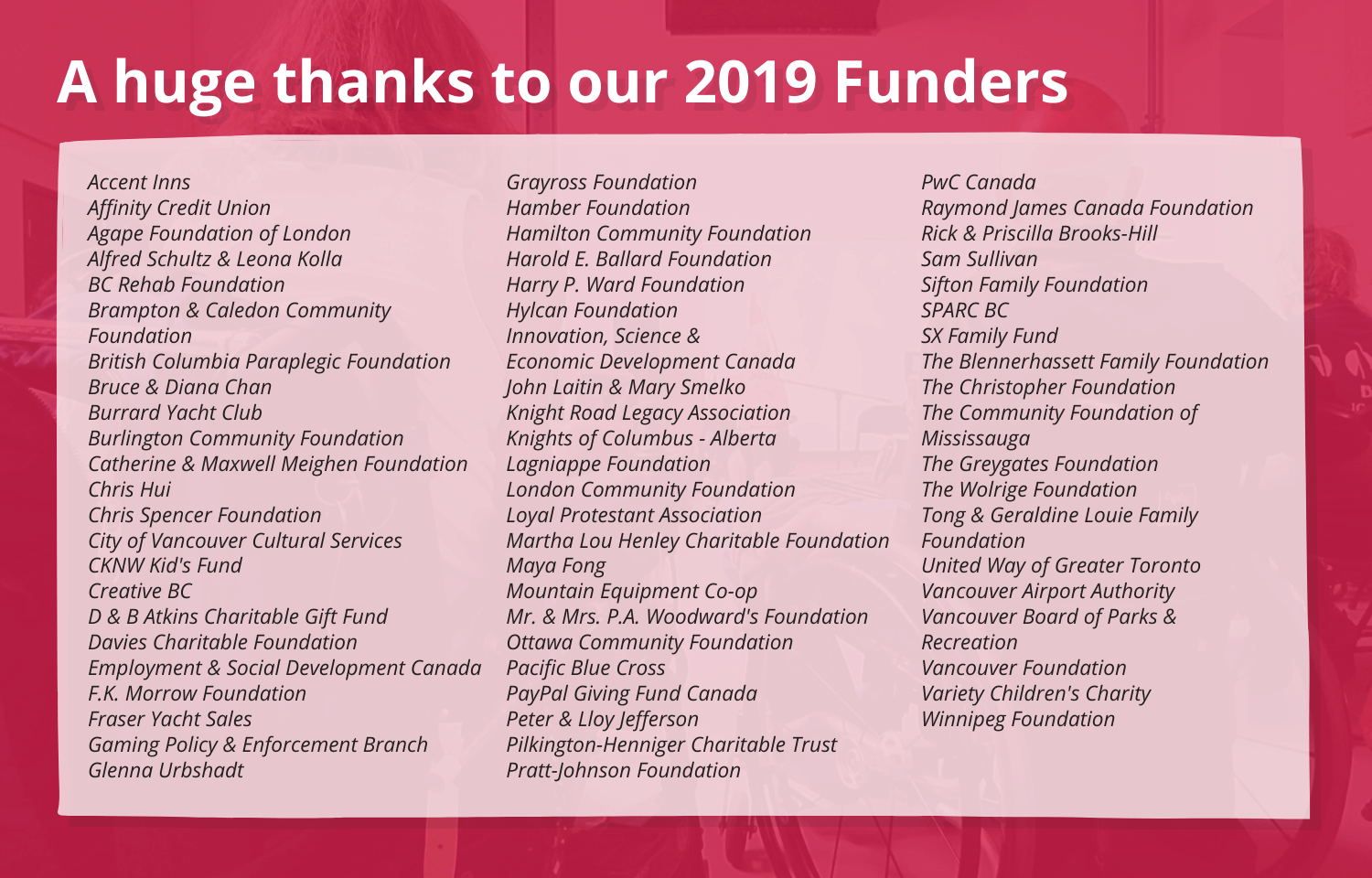
Enjoy this special edition of our Discover Newsletter – our 2019 Donor Impact Report!
Over the past year, we have heard from participants and supporters who were requesting more information and communications from the Foundation and about our affiliated Societies – BCMOS, ConnecTra, DIGA, DSA, Tetra and VAMS.
Whether you had your first paddling experience with BCMOS this year, or are considering cultivating your musical abilities with VAMS, Discover will share news about opportunities available for people with disabilities to re-imagine what is possible.
Mindful of the sheer amount of information circulating in your daily life, Discover will be published three times a year. You can also manage your preferences for receiving information from us.
Join our email list by visiting http://eepurl.com/gzP_BP or send an email to info@disabilityfoundation.org. Once you’re added to our email list, you will be able to update your email preferences at any time.
BC Mobility Society
BCMOS and Partners

BCMOS and MEC
Mountain Equipment Co-op (MEC) and BC Mobility Opportunities Society have been connected with the same passion for years. MEC inspires and enables everyone to lead active outdoor lifestyles. Their mission includes our community of people with disabilities and their pursuit of outdoor recreation. With generous donations of equipment, clothing, and gear, MEC helps BCMOS bring hiking, paddleboarding, and kayaking to life in Metro Vancouver.
BCMOS and BC Rehab
Since 2016, when BCMOS introduced paddling in its adapted outdoor recreation program there has been a growing interest in the activity. BC Rehab’s support to replace our aging kayak helped to ensure the safety of our participants and volunteers, and the continued opportunity to enjoy a healthy outdoor activity. And in 2019, their generosity took the paddling program at Creekside to another level. For the first time, the program opened from five to seven days and the impact was immediate. In a matter of a few hours, every available slot was reserved. Thank you BC Rehab!
ConnecTra

The 2019 BC Gaming grant has had an immeasurable impact on the ConnecTra community. With this grant ConnecTra was able to hold our annual flagship event “Abilities Expo and Job Fair”. This is an important event that brings the community together with local service providers, job recruiters, government organizations, and local vendors who cater to people with physical disabilities. Lively presentations, information exchange, creative performances, delicious food, and social networking all occur during the fair held at the Roundhouse Community Centre. This event has been connecting people with community resources for the last ten years. Abilities Expo and Job fair allows people to discover new possibilities that help and encourage them on their life’s journey.
Thank you BC Gaming!
Disabled Independent Gardeners’ Association BC

DIGA and the Hamber Foundation
In 2019, the Hamber Foundation generously granted the Disabled Independent Gardeners Association (DIGA) a donation that helped us to participate in more community gardens, allowing people with disabilities the enjoyment of gardening in their neighbourhoods. The impact of the grant includes new gardening beds, irrigation systems, and adapted gardening tools. The Hamber Foundation has been bettering the lives of British Columbians since 1965 and DIGA is grateful to be a part of their giving.
Thank you BC Gaming!
Disabled Sailing Association BC

Donor and Former DSA Volunteer Dr. Denys Ford and his wife Marguerite
Dr. Denys Ford was a volunteer for DSA for over a dozen years, and well into his 80s. He was one of the most reliable volunteers DSA has ever had and would volunteer on a minimum of a weekly basis throughout the summer. With his positive energy, his camaraderie with his volunteers and love to teach sailing will always be remembered. Dr. Ford also helped promote the program and introduced other volunteers to DSA and through the generous donations given by himself and his wife Marguerite, they continued to support DSA and help people with disabilities get out on the water. Dr. Ford’s dedication as a volunteer will never be forgotten and the generosity of Dr. Ford and his wife Marguerite is greatly appreciated of the Disabled Sailing Association of BC.

DSA & Wolrige Foundation
The growth and success of DSA-BC’s adaptive sailing programs is directly tied to the strong support from many individuals and organizations in and around Vancouver. Over the years, Alan and Barbara Wolrige have been the most steadfast supporters of DSA.
Through the Wolrige Foundation, Alan and Barbara have supported DSA-BC with a generous donation each year in memory of Michael Harvey, Barbara’s nephew. Since Alan and Barbara’s passing, their legacy of support has continued through the Wolrige Foundation.
Born and raised in Vancouver, Alan and Barbara were dedicated to many local causes, focusing in particular on the health and welfare of children and people facing hardships and obstacles in society. They were drawn to DSA-BC’s inclusiveness and the opportunities its programs offer, and were pleased to help make it possible for people with disabilities to learn to sail, compete in races and regattas, and experience the fun and new friendships that develop during Kids Days.
The Wolriges’ embraced the spirit of DSA-BC’s programs, from the independence and freedom that adaptive sailing offers to people with limited mobility, to the inspiring message that participants of all ages often express about adaptive sailing: “If I can do this, anything is possible!”
Tetra Society

Randy Schellenburg has made 100s of assistive devices for people with disabilities in Vernon BC and surrounding areas for over 20 years and in 2014 he was awarded Tetra’s lifetime achievement. He uses his own company QuickTurn Machining to help fabricate projects. Randy’s projects cover all aspects of daily living, whether it’s a modified toothbrush, or helping someone get outside on the downhill slopes on a modified sit-ski. Not only does Randy make projects but also has been a long-time donor to Tetra. Thank you Randy for your generosity and ingenuity and continuing to help make such a wonderful difference for the lives of people with disabilities throughout the Okanagan.
Vancouver Adapted Music Society

Forging New Truths
When his daughter-in-law Codi became a paraplegic after a tragic fall in March 2016, Harold Punnett felt compelled to actively seek a cure for paralysis.
That hugely ambitious idea marked the beginning of Harold’s NervGen journey.
A dentist by profession, Harold’s strong scientific background made him adept at researching and reading scientific articles about spinal cord injury. He found discouragingly few examples of promising research until he discovered the work of Dr. Jerry Silver at Case Western Reserve University in Cleveland, Ohio. He met Dr. Silver over the phone in the spring of 2016, and learned that the technology that was being developed was not only showing very positive results for spinal cord injury, but also for multiple sclerosis (MS) and other neurodegenerative diseases.
It is beyond the scope of this article (and its author) to fully describe the technical brilliance of Dr. Silver’s research. Simply put, when the body experiences injury or disease to the central nervous system (CNS), it forms a barrier of molecules around the injured area to prevent further damage and begin the healing process. However, this barrier, called the Glial scar, entraps the nerves and stops them from regenerating. Dr. Silver’s research has identified a peptide that can “trick” the nerves into not seeing the scar, and thus allow the nerves to regenerate and sprout to make new synaptic connections for functional improvement.
Harold was excited by the research, and realized that he would need to start a biotech company to develop a drug which would help people like Codi regain some mobility.
A connector by nature, Harold assembled a team of friends and colleagues across North America who were experienced in starting up companies of various sorts. They found the idea intriguing, and put together the financing and licensing agreements which raised enough capital to hire a Management and Operations team. They then took NervGen public in the spring of 2019. To date, $14 million has been raised to translate the technology to a real drug.
This is a remarkable achievement, but Harold cautions that the process required to properly create a drug for human use requires further patience and time. And even though he claims to be a skeptic by nature, Harold is a believer in this technology and he is confident that the next 12 months at NervGen are going to be “very exciting”.
Harold’s journey confirms his belief that with enough effort and will, we can forge new truths. Out of tragedy, something remarkable CAN happen.
NOTES: Some readers will be familiar with Codi Punnett because of the VAMS recording with her husband Ian, made in 2017, a year after her accident. You can find it at https://www.youtube.com/watch?v=56_MCFvnccI.
For further information about VAMS, go to www.vams.org.
You might also enjoy this recent video from April 2020 of their COVID experience with 3 kids at home 24/7 or Codi’s Blog, “Help Codi Heal”, a chronicle of her experiences over the past four years.
For further information about NervGen Pharma, please visit the website at www.nervgen.com.
Donor Profiles
Marjorie Rogers

Even as a child, Marjorie Rogers often suffered extreme fatigue, and experienced numbness and pain in her hands. But it wasn’t until 1987, when she volunteered to participate in trials for an early version of MRI technology, that she finally received her diagnosis of multiple sclerosis (MS).
Luckily for Marjorie, it was a slow progressing form of MS. She was able to retain her mobility for most of her life until about 3 or 4 years ago, when she started to use a wheelchair or scooter to get around.
However, Marjorie doesn’t tend to focus on herself. Instead, she tries to improve the situation for other people by being a grassroots activist. When she observes an inequity that increases the barriers for people with disabilities, she often will write to the appropriate branch of government to draw attention to the problem. Although she is committed to voicing her concerns in this way, she realizes that she and her community could really use a designated Disability Advocate in government to give them a voice.
Marjorie has been a recipient of the services of Tetra, whose pedal exerciser has helped her maintain some strength in her legs. And Tetra has inspired Marjorie to make some inventions of her own, to help herself and others.
For example, she has designed a hoop that can help people to independently put on their underwear or pants. The concept is simple: the waistband elastic is stretched over the hoop (which comes in S, M, or L), thus revealing the leg holes. The user puts their feet in the leg holes then simply pulls the hoop up, using the attached handles, drawing the waistband along with it.
Marjorie created another invention to assist her friend, a paraplegic, to take his coat off. A simple hook on the wall, on which one puts the sleeves of the coat, can help to pull the arm out of the sleeve. Humble, but life-changing.
These are just some of the ways that Marjorie helps others. Despite her limited means, she has also chosen to be a donor to the Disability Foundation, directing her donation – not surprisingly – to Tetra. As a recipient and an inventor herself, she knows that this is a powerful way to meet her goal of trying to make life a little bit easier for someone else.
If you are interested in learning more about Marjorie’s hoops or other inventions, please contact us at info@disabilityfoundation.org.
Safe and Affordable Accessibility as our City Opens Up

The people of BC continue to work together to “flatten the curve” of COVID19, and while we’re not out of the woods, things are slowly starting to open up. As people begin to feel more comfortable travelling again, we’d like you to know about a local co-op that makes safe, affordable and accessible transportation a priority.
Modo, BC’s own round trip carsharing co-op, has accessibility vans that can fit four passengers and a wheelchair user. In fact, they are the only shared accessibility vehicles in the province. The vans use a folding ramp and rear entrance for wheelchair users, which includes tie-down straps. Because of the complexity of adapting the vans for different abilities, an able-bodied person would be required to drive the van.
“For many, getting there can be half the fun. But for those living with mobility challenges, getting to places is often half the battle,” says Selena McLachlan, Modo Director of Communications. “Our social purpose – to connect people with places in a way that’s affordable, convenient, inclusive and sustainable – is core to who we are. This is especially true when it comes to members of our community who are under-served by conventional modes of transportation due to a number of reasons.”
One accessibility van is located at the City Hall of Vancouver surface parking lot; the other is in Victoria, located at Community Living Victoria. Using the van is quite affordable starting at $4/hour or $48/day for Modo Plus members, which includes gas and insurance. Round-trip carsharing means that the vans are returned to the original designated Modo parking spot after the booking period is over.
Modo’s offices are currently closed due to COVID19, but they are happy to welcome new members who meet the eligibility requirements and are able to complete their registration online. Anyone interested in joining Modo to use the accessibility vans (or other vehicles in the fleet), can sign up online with the code ACCESS50 for $50 in free driving.
Modo’s primary concern is keeping both members and employees safe. Whenever you do use a Modo van, you and all passengers should wash or sanitize your hands each time before entering or exiting the vehicle. Modo’s Fleet team also works hard to keep the vehicles clean, paying extra attention to high-touch places.
If you have any questions or concerns, please email Modo at info@modo.coop. Their local Member Care Team will be happy to assist.
A Win-Win Donation

Four years ago, Annette and Grant left their life in Oakville, Ontario to move to the West Coast to take advantage of an exciting career opportunity for Grant as a CEO in the banking business.
Upon arrival, they found a home in West Vancouver, close to the Thunderbird Marina. Eager to embrace their new life on the West Coast, they purchased a comfortable, sleep aboard powerboat so that they could explore the Coast on weekends and in their spare time.
Unfortunately, that free time never really materialized. Grant’s new job responsibilities caused him to log over 135,000 flight miles in a single year, which didn’t leave much time to use the boat. Eventually, they decided they no longer needed it. However, they found their initial efforts to sell the boat both frustrating and time-consuming.
One day, Grant was speaking with a colleague who is an avid boater. Sensing Grant’s frustration, he recommended donating the boat to a charity. Grant and Annette were quick to see that their investment in the boat could be used in a better manner – one that would benefit others.
At the end of February, Annette started searching online for boat donation programs and came across the Disabled Sailing Association’s web page. She contacted Dave McConachie, who responded promptly to her query. Shortly thereafter, Dave organized the survey of the boat for the purpose of valuation, and within a month, their boat donation was successfully completed.
Grant and Annette were very pleased with how painless and seamless the process was for them. Not only were they freed from the time-consuming hassle of selling a boat, they had the satisfaction of maximizing their asset by giving it back to the community. They made the very savvy decision to donate the boat proceeds directly to the Disability Foundation, for distribution in whichever way it deemed most useful for any of its six affiliated societies.
Having had such a positive experience, Annette and Grant would highly recommend the DSA Boat Donation program as a viable and convenient alternative to support programs for people with disabilities. They see it as a “win-win” – a painless and seamless process resulting in a meaningful and tax-deductible donation to the Disability Foundation, and hours of joyful adventure for the new buyer.
And, even though they are no longer boat owners, Grant and Annette continue to find ways to embrace the West Coast lifestyle!
In Memoriam
Harry Hardy

Harry James Hardy was a long-time volunteer who started with Tetra in 1994. He applied his electrical engineering skills and created 367 devices and assisted on hundreds of others. For many in Tetra’s vast community of coordinators, volunteers, and clients, when we think about Tetra, especially in BC, Harry comes to mind first.
A few of his many achievements included:
- Tetra Society’s Lifetime Achievement Award in 2010
- France’s Legion of Honor
- British Flying Cross
- Canada’s Sovereign Medal for Volunteers
- BC Community Achievement Award
To learn more about Harry’s life or to donate, please click the Harry Hardy Memorial Fund button below.